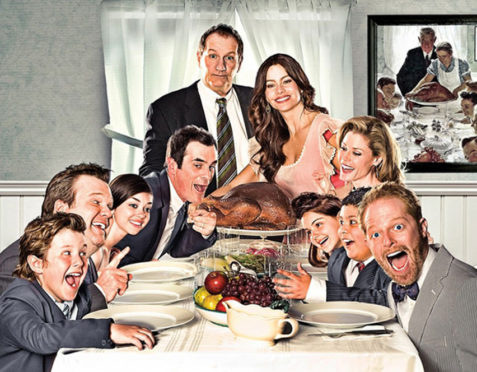
Sitting down to a roast Sunday lunch with the family may seem one of the ingredients of a happy life.
But it can be bad for your health as scientists warn people eat almost twice as much meat when dining with their relatives.
And the weekend is the worst time, with up to three meals a day featuring pork, chicken, or beef.
Academics were trying to understand why more people do not follow plant-based diets.
The study, led by Graham Horgan, principal statistical consultant, at the Rowett Institute, said: “Eating meat is viewed by many as being pleasurable, and an important part of traditional meal patterns, or a meal being incomplete without meat as the central component.
“Many consider that humans have evolved to consume meat, and that not doing so is unnatural.
“The demand for meat is high and many people enjoy eating it, which poses a challenge of knowing how to encourage people to eat less.”
The report added: “Meat is an important source of many nutrients and there are benefits including some in the diet where nutrient intakes can be marginal, for example iron, zinc and vitamin B12.
“Intakes, however, need to be in moderation as overconsumption of some meats can increase the risk of diet-related diseases.”
The public have been warned that red meat can raise the risk of cardiovascular disease tenfold, and processed foods such as sausages can increase the chances of oesophagus, and stomach cancer.
Experts have advised people to eat no more than 17 ounces – 500g – of meat a week, and only half a rasher of bacon per day. Meat eating also has environmental costs, with a fifth of all greenhouse gases caused by raising animals.
Last, week, the United Nations called on governments to introduce extra taxes on meat, to cut its consumption.
The Aberdeen researchers looked at the UK National Diet and Nutrition Survey – daily food and drink diaries from more than 4,000 people, over six years.
Volunteers were quizzed about when they ate, who with, and what.
Researchers found: “The amount of meat eaten was greater when eating with family members compared to when alone, or with other companions.
“Both the probability and amount of meat eaten in a single eating occasion were higher on Sundays compared to the rest of the week.”
Across the week, people were 50% more likely to eat meat in the evening, between 6 and 7pm, consuming more than three ounces, almost twice as much as at lunchtime.
Men ate more meat than women, with the difference increasing throughout the day. Old people ate the least meat.
On Saturday evening there was a big jump in consumption, and many said they also had a morning fry-up and dinner out at least once a month.
But Sunday was feast day for meat-eaters, with a full breakfast followed by either a later Sunday lunch, or early dinner.
The researchers said: “Eating with others is generally associated with greater meat consumption.
“In particular, eating with the family showed the greatest amount of meat consumed compared to eating alone or with other companions.”
They suggested people were on their best behaviour when eating with friends – trying to appear in control – while with family they could relax and tuck in.
“The presence of strangers can elicit an inhibitory response due to people’s concerns with making a good impression, which do not occur with family members,” added the study.
While Sunday was likely to remain the main day for meat-eating, “Meat-free Mondays” could be promoted.
One in eight Britons are now vegetarian, or vegan, with another quarter cutting back on meat.
The Scottish Government said that Scots are currently estimated to be well within the limits for red and processed meat with intakes below 60g per day.
A spokesperson said: “Health experts, are clear that animal-based products, such as meat and dairy, can be a part of a balanced healthy diet, given they are an excellent source of protein, vitamins and amino acids.”

Enjoy the convenience of having The Sunday Post delivered as a digital ePaper straight to your smartphone, tablet or computer.
Subscribe for only £5.49 a month and enjoy all the benefits of the printed paper as a digital replica.
Subscribe